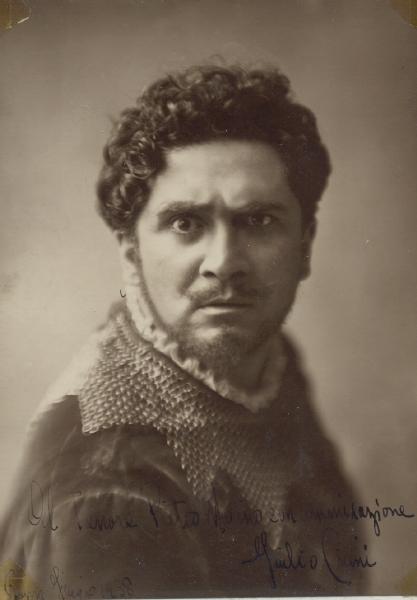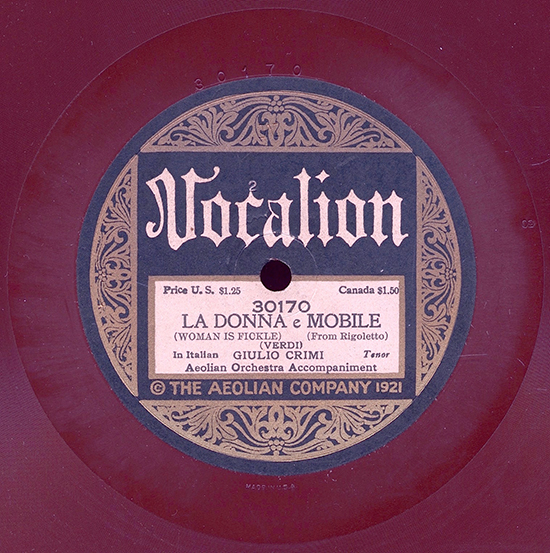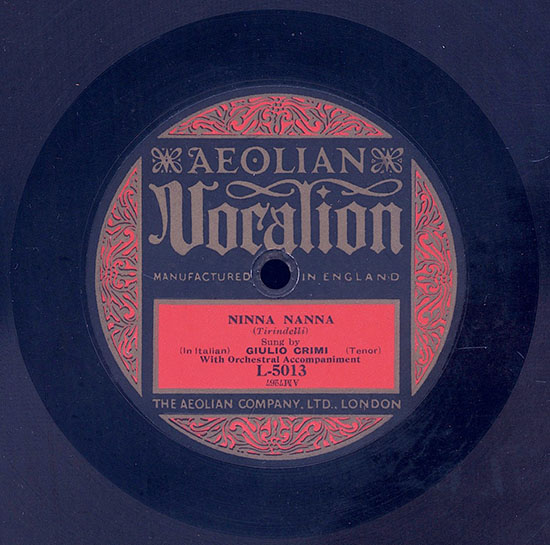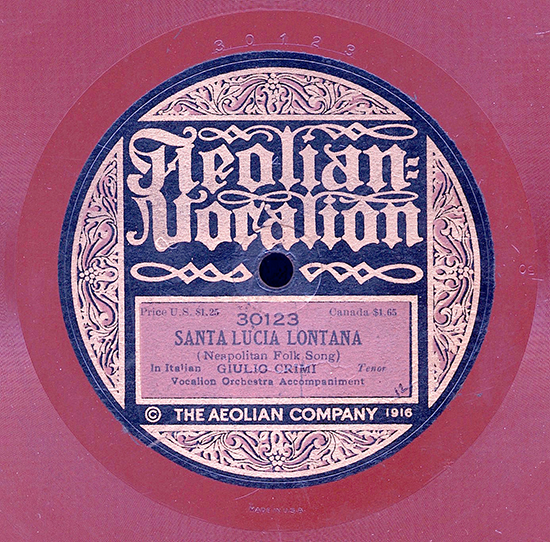Giulio Crimi
In RA format
In RA format
|
Born May 10th, 1885, in Paternò (Sicily), he studied voice with maestro Adernò, the most important voice
teacher in the provincial capital of Catania at that time.
He made his debut at the Teatro Bellini, again in Catania,
on November 30th, 1911, in Cavalleria rusticana, in a charity performance for the Italian Red Cross in order to support
the victims of the war in Libya. The next year, he sang La Wally in Treviso and Fanciulla del West and Manon Lescaut
both in Verona and Palermo, then Isabeau, Carmen and L'amore dei tre re (by Montemezzi) in Milano
(the source doesn't state at which theater). The latter opera was a particular success for Crimi, which he repeated
in 1914 at the Covent Garden Opera and in Paris. 1916 won him important triumphs: first, he was in Madrid for several
operas, among which Cavalleria rusticana and Mefistofele, Paolo e Francesca (by Luigi Mancinelli) and Francesca da Rimini
(by Riccardo Zandonai); then, La Scala called him to sing La battaglia di Legnano with Rosa Raisa.
With Raisa, he set sail for America: Aida, Chénier and Pagliacci at the Teatro Colón in Buenos Aires were followed by Traviata
with Amelita Galli-Curci in Chicago, where he also sang in Les huguenots and Lucia di Lammermoor; in 1918, he arrived at the
Met for a whole season, singing in Tosca, Aida, Bohème, Carmen, Gianni Schicchi and Il tabarro (the two latter New York
premieres, with Claudia Muzio and Luigi Montesanto).
For the following years, the chronicle is less complete; anyway,
he sang again in Buenos Aires, in Catania, in Rome. He added to his versatile repertory Il trovatore, Zazà, La forza del
destino, Madama Butterfly, Loreley, L'Africaine. He was a prototypical singer of the verismo age, and had a reputation
as a thrilling performer.
He concluded his career as early as December 31st, 1927, with Francesca da Rimini at the Teatro Carlo Felice in Genova
(conducted by the composer, and with Carmelo Maugeri in the cast, who had also sung in Crimi's debut performance in 1911) –
he is said to have had health issues due to high blood pressure, but obviously, he had also vocal problems
(not a big surprise, given his not very subtle technique!).
He lived in Rome thereafter, teaching; his most famous pupil was Tito Gobbi. Crimi died on October 28th, 1939.
Reference: Giuliano Consoli in a Tima Club "Le voci dell'Etna" LP booklet
|
Repertory
Cavalleria rusticana – Catania, Bellini, 30 November 1911
La Wally – Treviso, Sociale, November 1912
La fanciulla del West – Verona, Filodrammatico, 4 January 1913
Manon Lescaut – Palermo, Massimo, 12 March 1913
Isabeau – Milano, Dal Verme, 20 September 1913
L'amore dei tre re – Bologna, Comunale, 22 November 1913
La Gioconda – Torino, Regio, 1 January 1914
Francesca da Rimini – Torino, Regio, 19 February 1914
Finlandia (composer: Fracassi) – Torino, Regio, 19 February 1914
Carmen – Milano, Dal Verme, 14 October 1914
Tosca – Madrid, Reale, 12 January 1915
Paolo e Francesca (composer Mancinelli) – Madrid, Real, 2 February 1915
Cavalleria rusticana – Madrid, Real, 17 February 1915
Mefistofele – Madrid, Real, 10 March 1915
Andrea Chénier – Firenze, Politeama Fiorentino, April 1915
La battaglia di Legnano – Milano, Scala, 19 January 1916
Aida – Milano, Scala, January 1919
Pagliacci – Buenos Aires, Colón, 3 July 1916
Huemac (composer: De Rogatis) – Buenos Aires, Colón, 22 July 1916
Lucia di Lammermoor – Rio de Janeiro, Municipal, 8 September 1916
Gli ugonotti – Rio de Janeiro, 15 September 1916
La traviata – Chicago, Auditorium, 1 December 1916
La bohème – Chicago, Auditorium, 22 December 1916
I gioielli della Madonna – Chicago, Auditorium, 9 December 1917
Ernani – Chicago, Auditorium, 29 December 1917
Il tabarro – New York, Metropolitan Opera, 17 December 1918
Gianni Schicchi – New York, Metropolitan Opera, 14 December 1918
Il trovatore – New York, Metropolitan Opera, 4 March 1918
Zazà – New York, Metropolitan Opera, 16 January 1920
La forza del destino – New York, Metropolitan Opera, 5 February 1921
Don Carlo – New York, Metropolitan Opera, 12 March 1921
Madama Butterfly – Mexico City, Esperanza Iris, 29 October 1921
La Navarraise – New York, Metropolitan Opera, 30 November 1921
L'africana – Chicago, Auditorium, 23 November 1923
Loreley – Buenos Aires, Colón, 9 July 1924
O contrador de diamantes (composer: Mignone) – Rio de Janeiro, 20 September 1924
I wish to thank Tom Kaufman for his unpublished Crimi chronology.
I wish to thank Anton Bieber for the recordings and label scans of La donna è mobile, Ninna nanna and Santa Lucia luntana.
|



